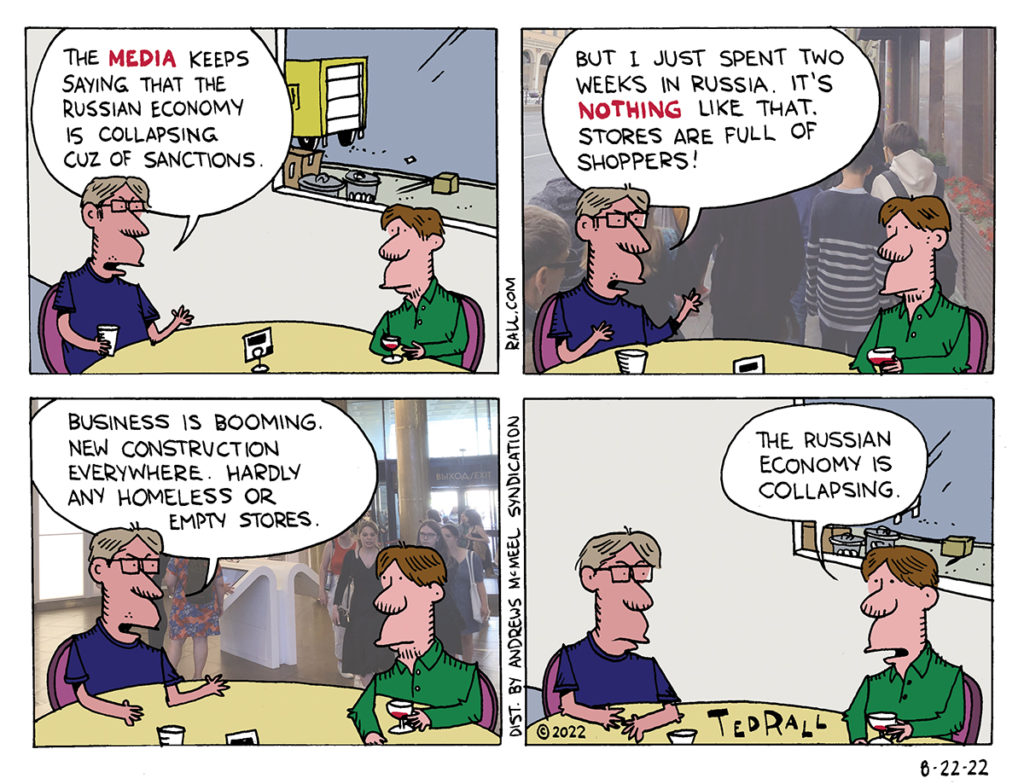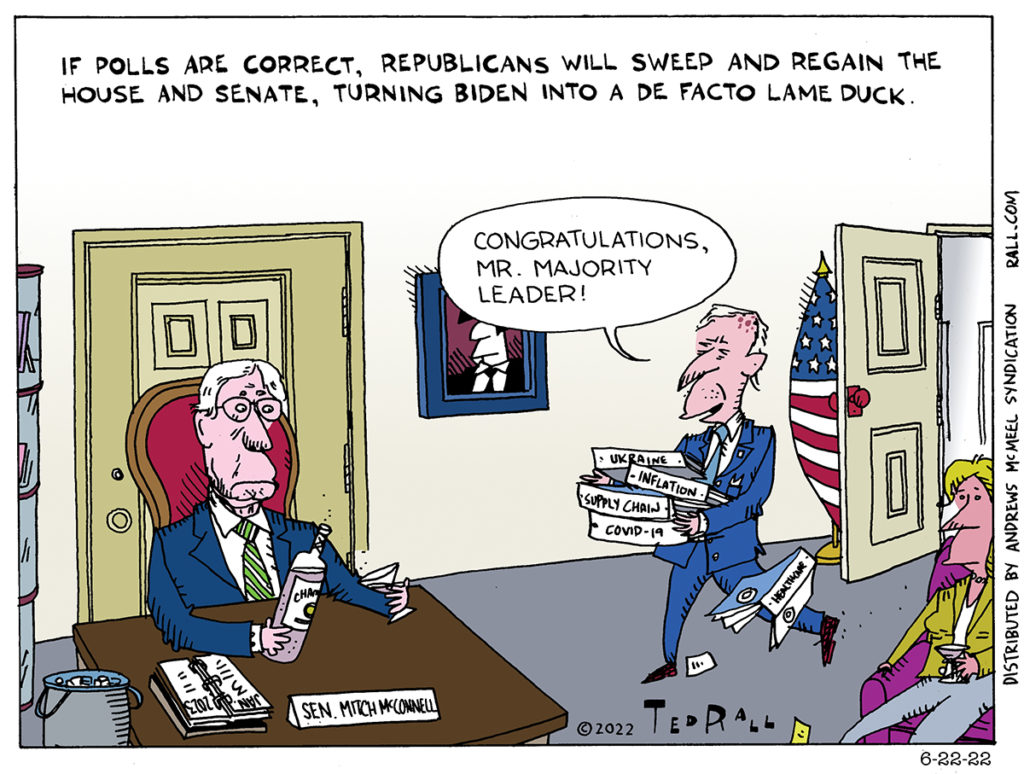The media says the Russian economy is collapsing. I just spent two weeks in Russia and there was absolutely no sign of that. Stores were bustling. Unemployment was low. I came home and told the truth but nobody cares.
In Actual Russia, No Sign of Sanctions
It’s time to get real. It’s been time to get real. Russia has won its war against Ukraine.
This outcome comes as no surprise. Anyone with access to a map could see that the chances of Ukraine prevailing against Russia were slim to none.
The only way Ukraine could have emerged victorious—which would, according to the Ukrainians themselves, mean pushing it out of Crimea and deposing the separatist pro-Russian republics of Donetsk and Luhansk—would have been if the United States and its Western allies had been willing to launch nuclear weapons, which would have led to global annihilation. Once the decision was made not to start World War III, Ukraine’s defeat became inevitable. This, everyone sane knows, is for the best.
Determinative to this conclusion was an unusual pair of motivations. Normally, when a war is fought on one country’s territory, the invaded country fights harder than the invading forces. Paradoxically, despite suffering damaged infrastructure, the invaded state enjoys the homefield advantages of complete knowledge of the battlefield and much shorter supply lines. Aside from sporadic cross-border missile strikes, this war has been fought entirely on Ukrainian territory.
This conflict is different because Russia has to win; it cannot walk away. Ukraine has a 1,200-mile border with Russia, it wants to join an anti-Russia military alliance and its government was openly hostile to Russia before the war. And when Germany invaded the Soviet Union in 1941, its armies came through Ukraine, where the Nazis were greeted as liberators. Unlike America, which could bring its troops home after losing on the other side of the world in Afghanistan and Iraq and shrug off its imperialist misadventures and could leave Vietnam after pretending that more political will on the home front would have resulted in victory, Russia sees its military operation as existential. Ukraine isn’t a misbegotten side project. It’s as essential in the same way the United States would respond to a Canada that turned hostile to the U.S.
Unfortunately and dangerously, American media consumers are being pounded with an endless deluge of propaganda promoting the ludicrous idea that Ukraine is winning and/or will ultimately prevail militarily. This fantastical assertion props up political support for shipping $60 billion worth of weapons to Ukraine, with more on the way—never mind the 70% that Zelensky’s wildly corrupt government sells on the black market and the Javelin missile systems that wind up for sale on the dark web. (Christmas is coming! Don’t forget your favorite political cartoonist and columnist.) By way of comparison, the U.S. Department of Health and Human Services estimates that we could abolish homelessness here for $20 billion.
We’re also being told that Russia is crumbling under the crushing blow of vicious Western sanctions deployed as part of the White House’s openly-stated war aim that it wants “to see Russia weakened.” The Russian economy, it is said, is collapsing. Russian elites, they say, will soon overthrow President Vladimir Putin.
Let me tell you firsthand: there is zero sign of economic distress in Russia.
I’ve spent the last two weeks in Moscow and Saint Petersburg, Russia’s two biggest cities. Stores are bustling, people are spending, unemployment is low and still falling, there are lines at ATMs and whatever else is happening, the economy is anything but bad. The Galeria Mall across the busy street from my hotel in Saint Petersburg has a few closed stores shut down by Western chains but the majority remain and consumers are shopping like mad. European and American tourists are few and far between, but it’s exactly the same here in sanctions-free Istanbul where I’m writing this. Westerners stopped coming at the start of the COVID-19 lockdown two years ago and still haven’t returned. If Russians are unhappy with Putin—and they’re not—it’s not because of the economy.
I know from bad economies; where I live in New York, crime is out of control, homeless people go untreated for an array of mental illnesses and some are killing people, and being killed, and many storefronts have been empty and boarded up since the beginning of the pandemic. Any New Yorker would or should happily trade places with their Muscovite counterpart, who lives in a city with clean streets and subways that don’t serve as rolling homeless shelters and where life feels as if COVID-19 was never a thing. News stories that claim Russia is on the ropes are a giant magnificent pile of lies so over-the-top that I can’t help but be impressed by their glorious audacity and easily-debunked mendacity. All you have to do is go to Russia, as I did, and see for yourself that it’s all bull—but hey, that’s a lot of trouble—because of sanctions that seem to be hurting us more than them.
Self-delusion is more fun. Who, after all, should you trust? The same U.S. state media that told you Saddam had WMDs? Or some cartoonist-columnist who told you, well in advance, that the U.S. didn’t stand a chance in Afghanistan, Trump would win in 2016 and that he would attempt a coup d’état to remain in power?
(Ted Rall (Twitter: @tedrall), the political cartoonist, columnist and graphic novelist, co-hosts the left-vs-right DMZ America podcast with fellow cartoonist Scott Stantis. You can support Ted’s hard-hitting political cartoons and columns and see his work first by sponsoring his work on Patreon.)
Kamala Harris: Human Repellent
Kamala Harris has consistently suffered from very low approval and likability ratings since becoming vice president after her very lackluster primary campaign. Whether her ability to connect with voters was hampered by Biden’s unwillingness to give her something important to do or not, the fact is, people just don’t like her.Kamala Harris has consistently suffered from very low approval and likability ratings since becoming vice president after her very lackluster primary campaign. Whether her ability to connect with voters was hampered by Biden’s unwillingness to give her something important to do or not, the fact is, people just don’t like her.
DMZ America Podcast #56: Another day, another mass shooting in America, Putin’s victory and Hillary 2024 is a thing
Ted and Scott have a full plate. First off, they discuss the latest mass shooting, on July 4th in Highland Park Illinois, and what, if anything, can be done to prevent the next ones. (Spoiler:they actually come close to agreeing on a solution). Next up, Ted predicted it and, sadly, it looks like Putin’s forces are pushing on to victory in eastern Ukraine. What comes next? Lastly, (and we are not making this up), there is movement afoot suggesting the Democrats need to make Hillary their nominee in 2024. Scott and Ted totally agree on what should be done about this…
DMZ America Podcast #55: Jan. 6th Investigation Gets Hot, Abortion Gets Aborted, Russia Bites Back
Political cartoonists Ted Rall and Scott Stantis debate and discuss the week’s issues from the Left and the Right. The Democrats’ Jan. 6th hearings turned interesting as a White House staffer claims she overheard the Secret Service discussing Trump’s trying to grab the wheel of the Presidential limo to lead the insurrection. Office gossip or treason? Women’s right to choose—is it toast in the red states or will a sustained campaign of protest…never mind. As Russia consolidates its gains in Ukraine, Presidents Rall and Stantis propose peace terms.
Trump and Biden are Both Liars. Only Trump Gets Called Out.

The following phrase, and its variants, has become ubiquitous: “Donald Trump’s baseless charges of election fraud.” Mainstream news outlets have accelerated its use during the congressional hearings on the January 6th Capitol riot.
The phrase is accurate. Though historically American elections have been marred by fraud and outright subversion, no evidence has surfaced to suggest that any such improprieties occurred during the 2020 presidential election that were substantial enough to change the result. As far as we know, Joe Biden was legitimately elected.
But is it journalistically kosher?
Fairness, accuracy and integrity are the core of journalistic ethics. Those values are compromised when they are applied inconsistently, as do American news companies.
Republicans, conservatives and supporters of former President Donald Trump in particular have long complained that corporate media outlets have been harder on him than on other politicians or previous presidents. It’s hard to disagree. Journalists’ labeling of Trump’s allegations that the 2020 election was stolen as a lie is a case in point; it’s impossible to think of another American politician who has been so repeatedly editorialized against in non-opinion news stories or to have his claims — no matter how untrue — repeatedly denied in headlines.
Biden and fellow Democrats, for example, have taken to calling high gas prices “Putin’s gas hike.” This is just as false as Trump’s election BS. The Wall Street Journal notes that gas prices were “turbocharged by a rebounding economy after a pandemic-induced slowdown” well before Russia invaded Ukraine. Anti-Russian sanctions imposed by the West, led by the U.S., exacerbated the problem. Whether or not Joe Biden is responsible for $5 gas, no one can credibly blame Vladimir Putin for the effects of sanctions he imposed against Vladimir Putin.
You won’t see headlines describing Biden’s spin on gas prices as “baseless” or “false.” As they do when any politician other than Donald Trump lies, the press acts as stenographers, dutifully passing on communiqués regardless of their truthiness. “Biden blames Russia for gas prices,” reports The Politico. “Biden slams ‘Putin’s price hike,’” says CNN. Calling out Trump for lying is great. Doing so is a reporter’s job. Why not Biden?
Willful inconsistency is the hallmark of how reporting becomes propaganda in the 21st century. As coverage of the January 6th hearings keeps reminding us, Donald Trump tried to steal the presidency. The same reporters had little to nothing to say about George W. Bush actually stealing the presidency; because Bush hates Trump, they treat the architect of torture, drones and Gitmo like an elder statesman. When the United States invades a foreign country there’s almost no attempt to humanize civilian victims but when the invading army belongs to a U.S. adversary coverage of the human cost – even the cost to animals — is exhaustive.
The facile defense to this critique is that reporters are setting the record straight when they label Trump’s lies as such. Trouble is, there are so many lies being told by so many politicians of every conceivable ideological orientation that limiting factchecks to one individual, even a former president and possible future one for whom the truth appears to be a mortal enemy, looks exactly like what it is: choosing sides by giving your fellow partisans a free pass. Further, because the press’ anti-Trump bias is so over-the-top, there is a natural tendency to dismiss it.
I’m not arguing that journalists should stop writing that Donald Trump is a liar. To the contrary, holding politicians accountable for untruths is long overdue. I’m saying they should do the same thing to other politicians as well.
Now that Russiagate has been thoroughly debunked, it would be nice to see news media say so. Instead of “US is worried about Russia using new efforts to exploit divisions in 2022 midterms,” CNN could say “US officials revive discredited claims on election ‘interference.’”
Instead of “Iraq War role was a stain on Powell’s record — one he openly said he regretted,” The Washington Post could say: “A million dead Iraqis later, Powell regretted lying America into Iraq War.”
Surely the courageous journalists who call out “Trump’s election lie” for what it is can present other stories in an equally straightforward manner. ABC’s “Slain journalist Jamal Khashoggi’s fiancee condemns Biden’s upcoming trip to Saudi Arabia” ought to be specific. After all, Khashoggi wasn’t passive-tense “slain.” In one of the most insane political assassinations in modern history, Khashoggi was viciously butchered in the Saudi consulate at the order of the Saudi crown prince. Biden isn’t merely going to Saudi Arabia, he’s planning to meet and shake hands with Khashoggi’s murderer. How about: “Fiancee of Jamal Khashoggi condemns Biden for upcoming visit with journalist’s murderer”?
(Ted Rall (Twitter: @tedrall), the political cartoonist, columnist and graphic novelist, is the author of a new graphic novel about a journalist gone bad, “The Stringer.” Order one today. You can support Ted’s hard-hitting political cartoons and columns and see his work first by sponsoring his work on Patreon.)
Be Careful What You Mitch for
Polls indicate that Democrats are about to suffer a shellacking in the 2022 midterm elections. Voters are unhappy about inflation, supply chain problems and other issues, but Republicans should be careful what they want — once they are in charge of Congress, they will catch much of the blame for the issues that allowed them to win in the first place.
Invade This
Whenever there is a foreign-policy crisis, liberals and conservatives alike decry isolationist tendencies and say that we must get involved. They are willing to go anywhere on the planet to help other people but when you ask them to help fellow Americans who are homeless and sick, they are nowhere to be found.






